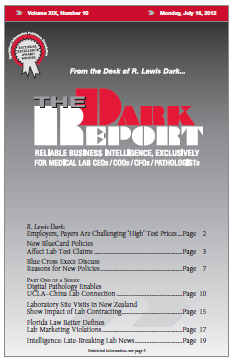CEO SUMMARY: In recent months, officials from the Blue Cross and Blue Shield Association (BCBSA) have responded to the concerns about new billing protocols for services provided as part of the BlueCard program and voiced by such clinical lab associations as the California Clinical Laboratory Association (CCLA) and the National Independent Laboratory Association (NILA). BCBSA …
Blue Cross Execs Discuss Reasons for New Policies Read More »
To access this post, you must purchase The Dark Report.


